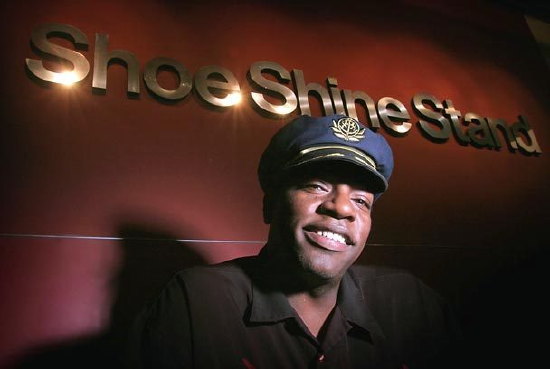
(above) Leon
McLaughlin hopes to apply for grants to install his water-filtration
machines in communities,
instead of just disaster areas — the next
two will be at a school and a hospital — in each of the 59 countries
World Vision works in. Photo: ELLEN M. BANNER / THE SEATTLE TIMES
Filtering out a global problem
July 14, 2008 - Seattle Times
By Jeff Raderstrong, Seattle Times staff reporter, 206-464-3301 or jraderstrong@seattletimes.com
Leon McLaughlin owns and operates a shoeshine stand in Seattle, a job that has helped support a growing mission to provide water-filtration machines to developing countries.
Leon McLaughlin was traveling in Mexico when he met a woman who told him a story about a visiting American tourist.
The tourist asked to use her bathroom and saw the bathtub was full of water, so he drained it. He told the woman what he had done and she started to cry.
"She said: 'That was my water for the month,' " McLaughlin recalled.
Back in Seattle, McLaughlin set out to find a water-filtration machine to help people like the woman in Mexico, then founded his one-man company, LAM, to bring the machine to developing countries. Two years later, six machines are installed in disaster-prone areas in Bolivia.
All between shining shoes.
McLaughlin, 53, owns and operates a shoeshine stand on the second floor of the downtown Columbia Tower. He has owned the stand for over a decade, but started working there daily only about four years ago, serving as a de facto office for his clean-water operation.
On the walls next to the leather chairs for his customers, McLaughlin taped pictures of Bolivians installing his first effort, the Outpost filtration machine, a giant network of filters and white pipes reading "AGUA POTABLE." Manufactured by Georgia-based First Water, it generates 740 gallons of clean water per hour.
Some of McLaughlin's customers aren't aware of his water work, which he considers his real job.
"I was surprised," Keith Kurko, science manager at Seattle Public Utilities and a customer of McLaughlin's for years, said when he first heard of the water-filtration effort. "I was like, is this real? And it was."
Man of many talents
At $5 a pair ($8 for boots), shining shoes doesn't pay the bills. McLaughlin also sells real estate and works nights as an usher at the Seattle Repertory Theatre.
McLaughlin came to Seattle from his native Cleveland when he was 22 as staff adviser for the Paramount Theatre and worked there until the early 1990s before moving full time to the Seattle Rep and investing in real estate. In the mid-1990s, he started a business in Canada selling coffee-making equipment and began traveling back and forth from Vancouver.
The business sparked his interest in water, which grew as he traveled and discovered water problems around the world. Finally, when he began to research different water companies, he saw the growing investment in water management.
"This stuff is just like oil," McLaughlin said. "This stuff is going to be a commodity."
The United Nations Development Programme estimated that almost 2 million children die every year due to contaminated water sources, and about 1.2 billion people do not have access to safe water.
So, McLaughlin went back to school and studied water maintenance through online classes at Sacramento State. After forming LAM (his initials and an acronym for Land and Water Maintenance), he partnered with Federal-Way based World Vision to bring the first six machines to Bolivia.
McLaughlin hopes to apply for grants to install the machines in communities, instead of just disaster areas — the next two will be at a school and a hospital — in each of the 59 countries World Vision works in.
"It's like you have a coffee shop on every corner, but instead you have clean water in every village," he said.
LAM buys the filtration machines for $8,500 from First Water, then donates them to World Vision through a nonprofit. For each unit sold, LAM gets $2,000 in commission, which McLaughlin said he puts back into technical support for the distribution and upkeep of the machines. McLaughlin said he doesn't take a salary.
Dean Salisbury, associate director of World Vision's global supply-chain management unit, said they wanted a company that would donate the machines, provide free transportation, free tech support and free maintenance.
McLaughlin was the only one willing to do that without being concerned about the costs.
"His goal in life is not to make money, but to help people," Salisbury said. "It's very refreshing in the corporate world."
An unusual office
McLaughlin doesn't want to shut down the stand, though, and open up a more traditional office for LAM, because he doesn't think he could find a better location.
"You couldn't get a better office," he said. "This is where it all happens."
Many of McLaughlin's customers are attorneys that work in the Columbia Tower or city officials who work next door at City Hall. They give him advice on legal issues or suggestions for different filtration devices.
On a recent afternoon, an attorney stopped by. Before the five-minute shine was up, the attorney offered to show McLaughlin a few patents for electronic water sensors he was working on.
McLaughlin readily agreed.
Salisbury thinks McLaughlin's work can be an example to others. "Why can't big corporations do this?" he said.
Jeff Raderstrong: 206-464-3301 or jraderstrong@seattletimes.com